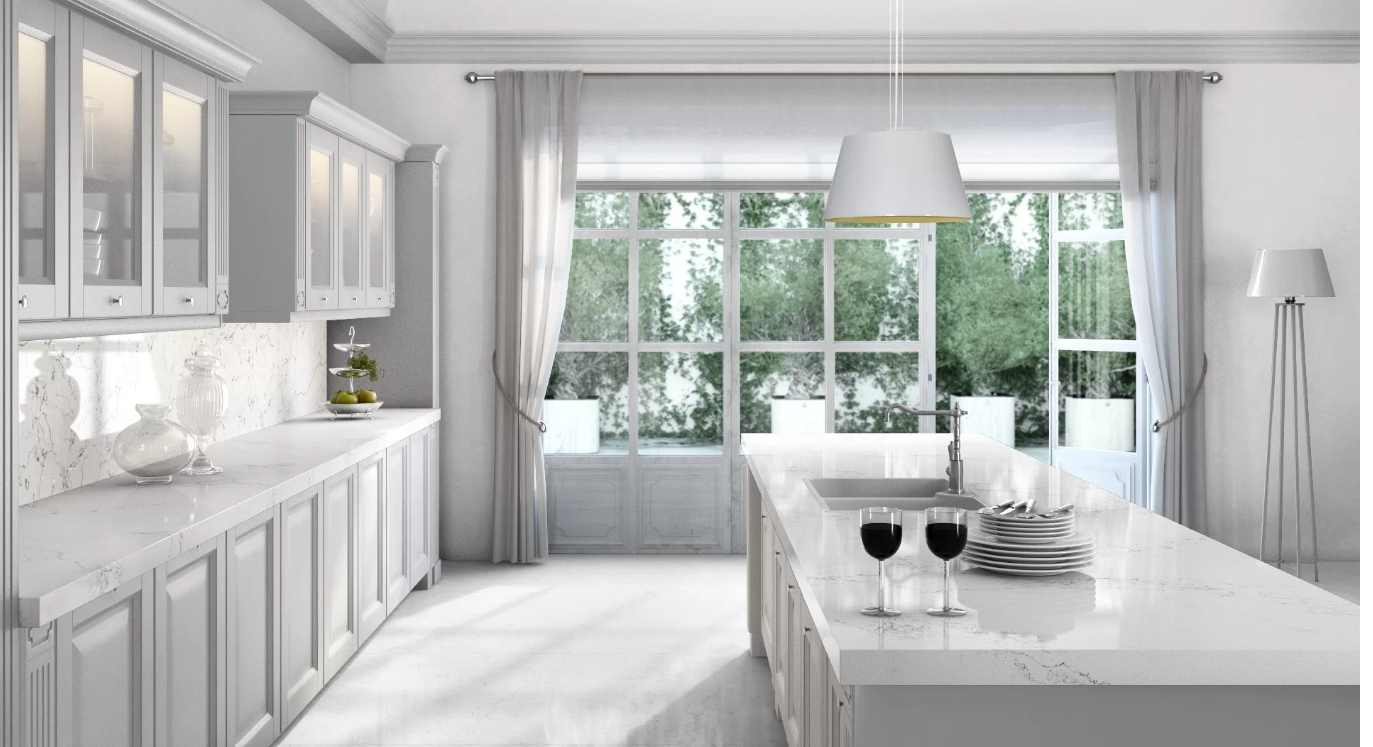- November 9, 2024
- 0
- Quartz
Quartz vs. Other Engineered Stones: Which is Best for a Contemporary Kitchen?

When designing a contemporary kitchen, choosing the right countertop material is crucial. Engineered stones, including quartz, are popular choices due to their durability, low maintenance, and aesthetic appeal. However, with several options available, it can be challenging to decide which material is best suited for your kitchen. Here’s a comparison of quartz with other engineered stones to help you make an informed decision.
- Quartz: The Gold Standard
Quartz is one of the most popular choices for contemporary kitchen countertops, and for good reason. Made from a blend of natural quartz crystals and resins, quartz countertops are incredibly durable, resistant to scratches, and non-porous, making them resistant to stains and bacteria. Quartz offers a wide range of colors and patterns, including options that mimic the look of natural stone like marble and granite. Its consistency in appearance, combined with low maintenance requirements, makes it a top choice for busy modern kitchens.
Pros:
- Highly durable and scratch-resistant
- Non-porous, stain-resistant, and antibacterial
- Wide variety of colors and patterns
- Low maintenance; no sealing required
Cons:
- Can be expensive
- Sensitive to extreme heat
- Marble: The Luxurious Alternative
Marble is a natural stone often admired for its luxurious appearance and unique veining patterns. Engineered marble countertops offer a similar aesthetic but with improved durability and reduced porosity. However, even with these enhancements, marble is more prone to staining and scratching compared to quartz. Marble countertops require regular sealing and more careful maintenance to keep them looking their best, which might not be ideal for a busy contemporary kitchen.
Pros:
- Luxurious and timeless appearance
- Unique veining patterns
- Suitable for homeowners seeking a high-end look
Cons:
- Prone to scratching and staining
- Requires regular sealing and maintenance
- More expensive than quartz
- Granite: The Natural Beauty
Granite, like marble, is a natural stone, and its engineered counterparts aim to offer the same stunning look with enhanced durability. Granite countertops are heat-resistant and scratch-resistant, but they are porous, requiring regular sealing to prevent staining. The natural variations in granite’s patterns and colors add a unique touch to any kitchen, but these variations can also be seen as a drawback for those seeking a more uniform appearance.
Pros:
- Heat-resistant and durable
- Natural, unique patterns and colors
- Adds value to your home
Cons:
- Requires regular sealing
- Patterns can be inconsistent
- Heavier and more challenging to install
- Dekton: The Newcomer
Dekton is a relatively new engineered stone made from a mix of raw materials, including quartz, porcelain, and glass. It’s designed to be incredibly durable, resistant to scratches, stains, and heat. Dekton is an excellent option for homeowners seeking an ultra-modern, seamless look in their kitchen. However, it’s worth noting that Dekton can be prone to chipping, especially on the edges, and it is often more expensive than quartz.
Pros:
- Extremely durable and heat-resistant
- Non-porous and stain-resistant
- Available in large slabs for a seamless look
Cons:
- Expensive
- Can chip easily, especially on edges
Conclusion
While all engineered stones have their unique benefits, quartz stands out as the best option for contemporary kitchens due to its durability, low maintenance, and wide range of design options. Quartz offers a perfect blend of form and function, making it a reliable and stylish choice for busy modern households. However, if you’re looking for a more luxurious or unique look, engineered marble or granite might be worth considering, while Dekton is ideal for those seeking cutting-edge materials with a sleek, modern finish. Ultimately, the best choice depends on your specific needs, budget, and aesthetic preferences.
